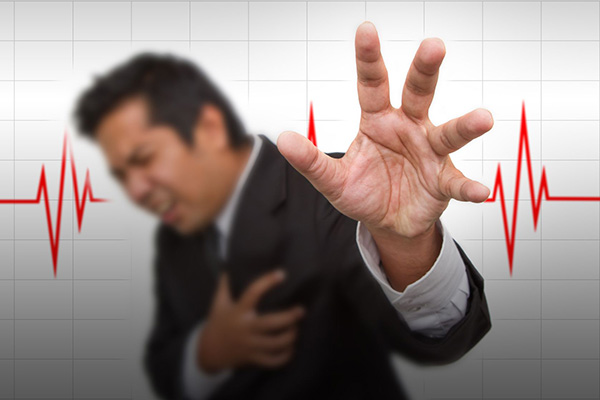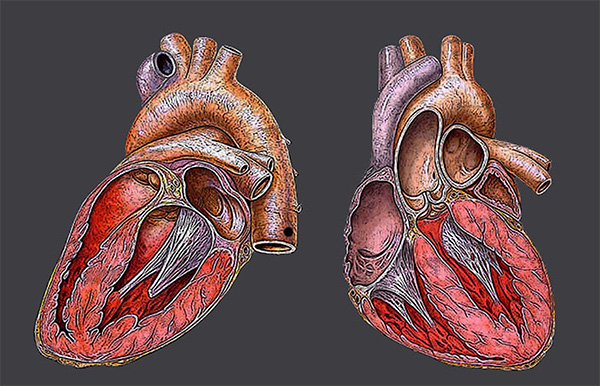Heart failure occurs when the heart muscle does not pump enough blood in the arteries, as the body needs. The disease can be caused by a few diseases that can affect the heart and thus, its capacity of pumping. When the heart does not effectively pump blood through the body, it returns slowly to the heart, a situation that will lead to accumulation of fluid in the lungs, or other parts of the body.
Heart failure is a progressive disorder that worsens over time. Usually starts when the heart is damaged or weakened as a result of a heart attack. At first, the body is trying to compensate the decreased pumping ability of the heart by; salt and water retention, increasing the amount of blood in the bloodstream, increasing the workload and the size of the heart. Eventually, the body attempts to compensate, will only worsen the existing heart failure.
What are the types of heart failure?
Typically, heart failure affects the left ventricle in two ways:
– Systolic failure – this occurs when the ventricle is no longer strong enough when contracting, to pump blood to the body.
– Diastolic failure – occurs when the ventricle does not relaxes enough, and this affects the ability to fill with blood.
If the left side of the heart is more damaged, it will not be able to pump enough blood to all organs of the body, including the heart itself. At the same time, the blood must return to the right ventricle, and if is having trouble in doing so, it stagnates in circulation, and cause extra fluid – failure on the right side.
Insufficiency of right and left side are often present simultaneously. Besides the classification according to heart failure type, there is also a classification according to the severity of it.
What causes heart failure?
Failures can be caused by several diseases that affect the heart and its ability to pump blood:
- Coronary artery disease and, especially, myocardial infarction;
- High blood pressure (hypertension);
- Heart muscle disease cardiomyopathy;
- Congenital heart disease;
- Disease of the heart valves;
- Diseases of the pericardium;
- Arrhythmias.
A number of factors can cause sudden failure, such as taking medicines incorrectly, a heart attack, blood clots that travel to the lungs, infection, use of alcohol, excess salt, physical effort.
What are the symptoms of heart failure?
Typical symptoms of heart failure are:
- Shortness of breath, frequent;
- Swelling, especially in the legs, ankles;
- Weight gain, sudden;
- Dizziness, fainting or weakness;
- Fatigue;
- Dry cough, especially when you lie down;
- Increased urination at night;
- Nausea, bloating.
Acute failure:
Acute failure occurs when the lungs fill with water quickly, a situation called pulmonary edema.
Symptoms develop rapidly and can include:
- Shortness and inefficiency of breath;
- Rapid and irregular heartbeats;
- Cough with frothy and pink secretions.
Acute failure is a medical emergency and requires immediate care.
How is heart failure diagnosed?
Echocardiography is the best and simplest method of diagnosis.
It also helps to assess the severity of failure. Echocardiography uses sound waves to create a moving picture of the heart. It is usually the first test done after the occurrence of such medical problems. Also, chest radiographs may help in the diagnosis. Echocardiography may also be used to monitor failure, measuring, as the blood is pumped from the left ventricle. Doctors know when failure worsens, by monitoring symptoms, and determining whether the so-called ejection fraction is decreased.
What to expect in case of heart failure?
Heart failure is a condition for life, which in turn worsens. Some medications and many lifestyle changes needed to improve heart failure can have a positive impact on quality and length of life. In the early phase, minor symptoms can occur only during strenuous activities. Over time, symptoms like shortness of breath, bloating and fatigue will be present all the time, even at rest.
Treatment can reduce these symptoms, but usually not remove them. When failure worsens, a chronic state of fatigue and weakness installs, despite properly administered treatment. Acute failure develops rapidly and can cause death if the patient does not receive immediate medical help.
After the diagnosis of heart failure, is likely to be necessary to administer drugs, for life. Diet and lifestyle changes are also important in treating the symptoms. Limiting salt intake, rest, and moderate activity, avoiding infection and careful use of drugs – all these are important ways to control heart failure and prevent complications, hospitalization and sudden death.
Probably, a combination of medications will be recommended. These drugs help the heart pump blood better and will control the symptoms. Medications, although not cure heart failure, may still ease symptoms and may improve heart function, can slow the progression and reduce the risk of complications.
Your doctor may recommend surgical treatment, such as coronary artery bypass if the blood vessels from the heart are blocked. A heart transplant is taken into account only when symptoms are severe and do not respond to standard forms of treatment. Seek immediate help at a cardiologist if you suspect failure symptoms, or if symptoms worsen. Also, seek medical help if you have signs of acute failure, heart attack, or stroke.
Complications of heart failure in the long term, may include:
- Diseases of certain organs often kidney failure, resulting in decreasing the amount of blood and oxygen;
- Irregular heartbeats and sudden death;
- Stroke;
- Heart attack;
- Thrombosis and pulmonary embolism;
- Problems of the heart valves.



